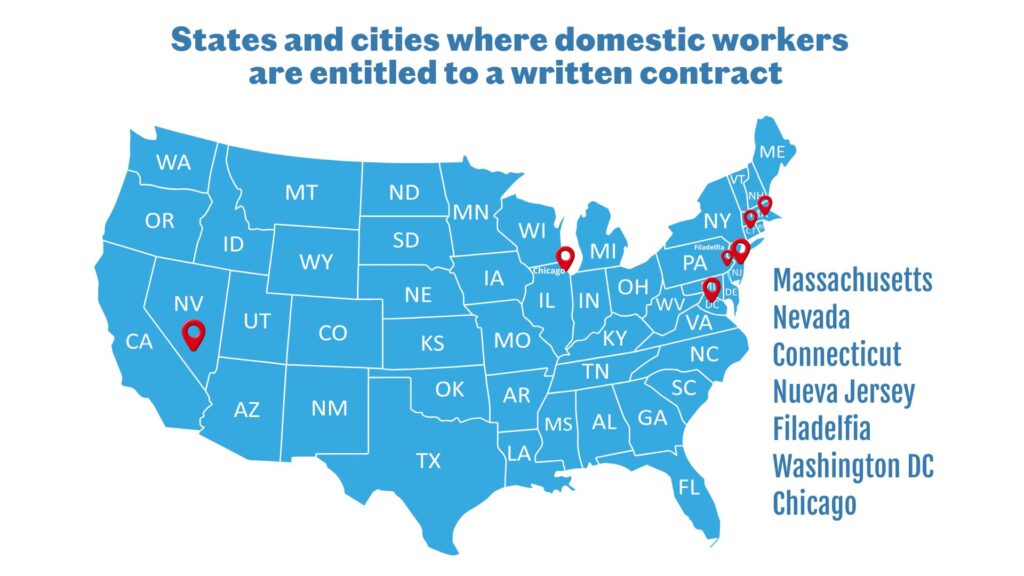A recent La Alianza survey revealed that the majority of domestic workers feel that they do not have enough voice to influence crucial decisions regarding their work, such as wages and working conditions.
Unlike other industries, where working conditions are often defined through a written contract between an employer and an employee, the domestic work sector is still largely informal.
This means that many domestic workers do not have access to a written agreement that stipulates their working conditions, which results in a lack of clarity around their responsibilities, the schedule, wages, and other aspects of the job.
“[However], it is possible for any of us to negotiate a contract with our employer to demand what we want and what we think is fair in our jobs,” affirmed Leidys Muñoz, an Enforcement Manager with the National Domestic Workers Alliance (NDWA) in New York, during a training for domestic workers on negotiations.
Note: The National Domestic Workers Alliance is La Alianza’s partner organization.
Recognizing the importance of this skill, La Alianza has developed a series of articles in which, through insights from domestic workers and other experts, we explain how to initiate and carry out a labor contract negotiation process in order to improve working conditions and how to monitor compliance with the agreements.
What is a negotiation?
Negotiation is the process of arriving at an agreement between a worker and an employer with regards to the expectations, responsibilities, and obligations as they relate to a job.
“Every time you have a conversation about how to do your job, you are negotiating. Every time you ask for something you need, you are negotiating,” affirms NDWA member Rosa Peña. “It’s possible you think that you don’t have negotiating experience, but if you have done any of these things, you do have experience.”
Keep in mind that a labor negotiation is not just limited to wages, but also includes working conditions, safety, and labor rights.
Know Your Rights
The first thing we recommend is to consult with a local domestic worker organization to learn about what rights domestic workers have in your city and state.
In Massachusetts, Nevada, Connecticut, and New Jersey, as well as Philadelphia, Washington, D.C., and Chicago, domestic workers and employers are required to have a written agreement.
In other places, contracts are not required by law, but it is still possible to demand a contract from an employer, according to NDWA experts.

“We know that our work has always been undervalued and that can make us feel like our work isn’t valuable. As a result, many of us feel uncomfortable asking for more than we feel we deserve or more than what our employers offer us,” Peña says. “But we should always remember that our work is dignified, respected, and it is work that opens the door to other jobs.”
Tips for Initiating a Negotiation
Building trust, exchanging ideas, and making counter-proposals are fundamental, but often overlooked, negotiation skills. The following advice from NDWA can help you reach a successful agreement.
- Know what you want: We all have different needs. Know what you want and negotiate for what you want and deserve. Keep in mind that you may not be able to get everything you want, so it is important to identify your main priorities and write them down before going to negotiate.
- Know what will not work for you: When negotiating, it is generally necessary to ask for more than you want, understanding that it is likely that the employee will counter your proposal.
It may be helpful to think ahead about both what you want and what you are willing to settle for. For example, what you really want is that they pay you $30 per hour, you might ask for $32, and the least you would accept is $28.
Keep in mind that this is just an example. The rate that you ask for will depend on many factors, including your level of experience, what training you have, your work responsibilities, as well as your financial needs.
- Know your employer‘s needs: Negotiation is about trade-offs. When thinking about what to propose, also think about what your employer might want and need. Understanding the needs of your employer will give you the power to negotiate for what you want.
- Prepare yourself for the conversation: Choose an appropriate moment to ask for what you need. NDWA recommends sending a message to propose a time to meet with the employer in person to discuss the contract.
The best time to negotiate is during the job interview. You can say that you are open to considering the job and that you want to have the expectations in writing. Another good time to ask for a contract is when something changes in your job.
It is never too late to ask for a contract, according to NDWA. If you don’t have a contract in your current job, you can say the following to your employer: “I like working with your family and I think it would be good to put our agreement in writing. Could we find a time to discuss this further?”
If your employer speaks English and you don’t feel confident enough to negotiate in that language, you can follow some of the recommendations in this article: Five strategies for an initial conversation with a client who only speaks English
- Don’t sign anything right away. Take your time to do it well. Negotiating should take time. Take your time to think and talk over the working conditions with your family or community before signing any documents.
Make sure that the final agreement includes five of your top ten priorities. If it doesn’t, add what you’re looking for and make a counterproposal.
Editor’s note: This article was originally written in Spanish and translated into English by Tilde Language Justice Cooperative


